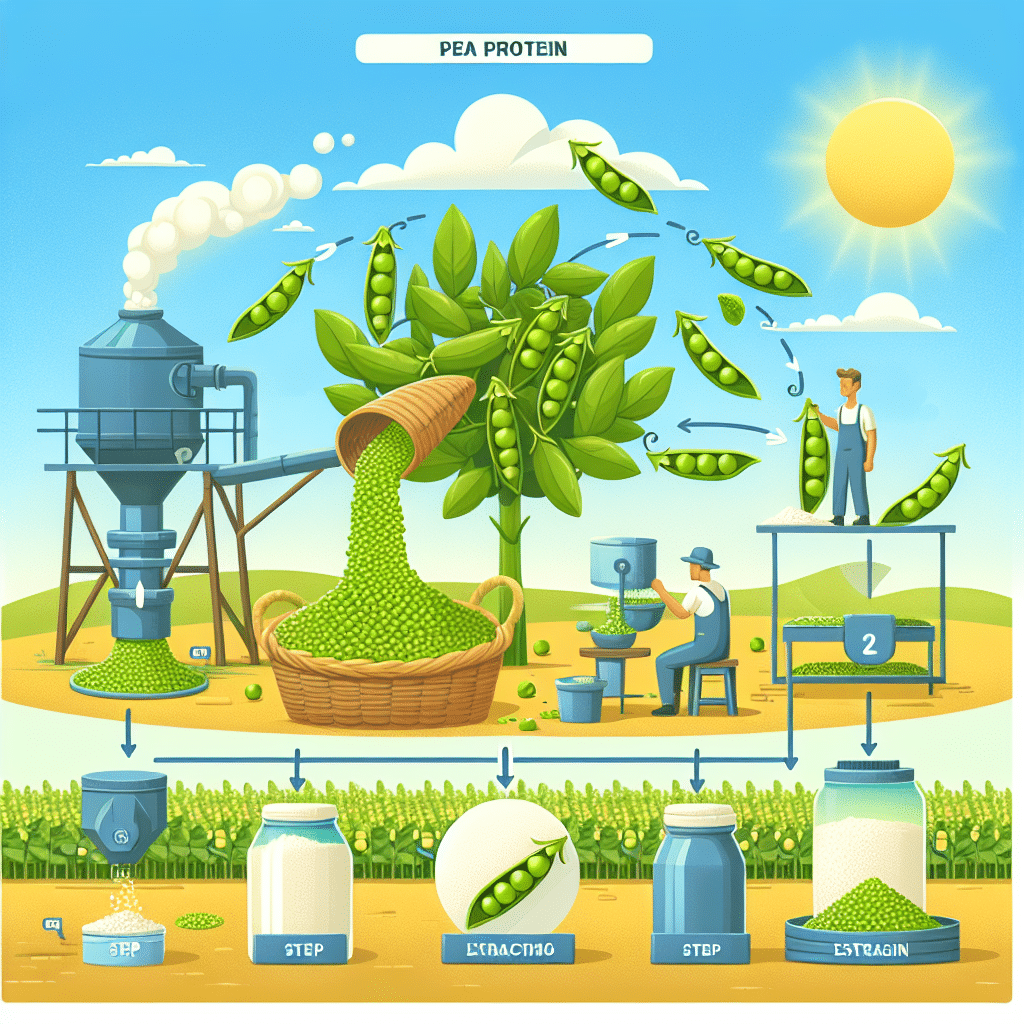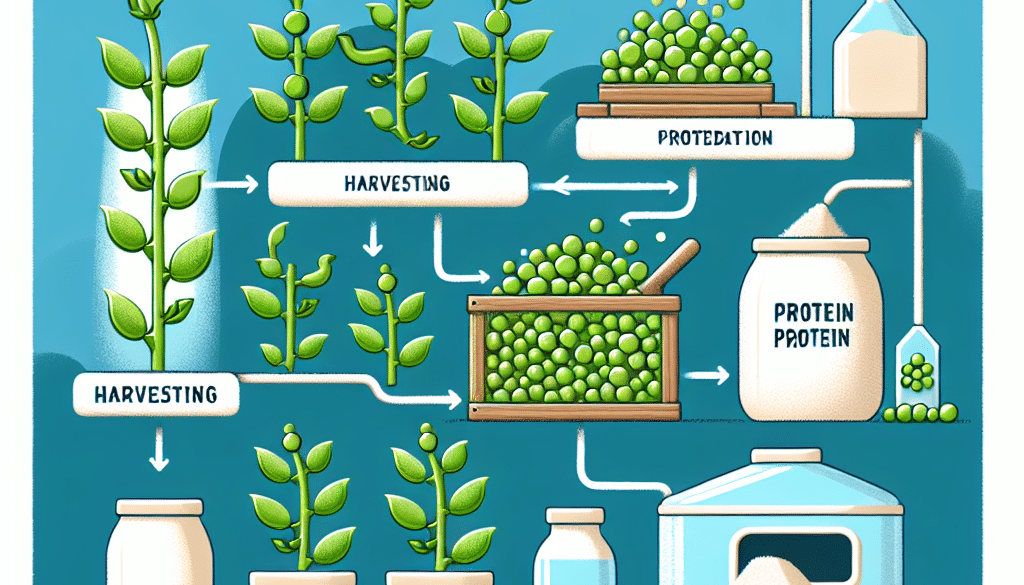What is Pea Protein Made Of: Ingredient Insights
-
Table of Contents
What is Pea Protein Made Of: Ingredient Insights

Pea protein has gained significant popularity in recent years as a plant-based alternative to traditional animal-based protein sources. It is widely used in various food and beverage products, including protein powders, bars, and meat substitutes. But have you ever wondered what pea protein is made of? In this article, we will explore the ingredients that make up pea protein and delve into its nutritional benefits.
The Source: Yellow Peas
Pea protein is derived from yellow peas, also known as Pisum sativum. These peas are a type of legume that belongs to the Fabaceae family. Yellow peas are commonly grown in North America, Europe, and Asia, making them easily accessible for pea protein production.
Yellow peas are an excellent source of protein, fiber, and other essential nutrients. They are low in fat and cholesterol-free, making them a healthy choice for individuals looking to incorporate more plant-based proteins into their diet.
The Extraction Process
The process of extracting pea protein involves several steps to separate the protein from the other components of the pea. Here is a breakdown of the extraction process:
- Cleaning: The yellow peas are thoroughly cleaned to remove any impurities or foreign matter.
- Milling: The cleaned peas are milled into a fine powder to increase the surface area for extraction.
- Protein Extraction: The milled pea powder is mixed with water to create a slurry. Enzymes are then added to break down the carbohydrates and fibers, leaving behind the protein.
- Separation: The slurry is then separated using centrifugation or filtration techniques. This process removes the insoluble components, leaving behind a concentrated pea protein solution.
- Drying: The concentrated pea protein solution is spray-dried to remove the water content and create a powdered form of pea protein.
The resulting pea protein powder is then packaged and ready for use in various food and beverage applications.
Nutritional Profile of Pea Protein
Pea protein is not only a sustainable and environmentally friendly protein source but also offers a range of nutritional benefits. Here are some key insights into the nutritional profile of pea protein:
- High Protein Content: Pea protein is rich in protein, typically containing around 80-90% protein by weight. This makes it an excellent choice for individuals looking to increase their protein intake, especially those following a plant-based or vegetarian diet.
- Essential Amino Acids: Pea protein is a complete protein, meaning it contains all nine essential amino acids that the body cannot produce on its own. These amino acids are crucial for various bodily functions, including muscle repair and growth.
- Low Allergenic Potential: Pea protein is hypoallergenic and does not contain common allergens such as gluten, dairy, or soy. This makes it suitable for individuals with food sensitivities or allergies.
- Rich in Branched-Chain Amino Acids (BCAAs): Pea protein is particularly high in BCAAs, including leucine, isoleucine, and valine. These amino acids play a vital role in muscle protein synthesis and can aid in muscle recovery and growth.
- High in Fiber: Pea protein contains a significant amount of dietary fiber, which can help support digestive health and promote feelings of fullness.
- Low in Fat and Cholesterol: Pea protein is naturally low in fat and cholesterol, making it a heart-healthy protein option.
Applications of Pea Protein
Pea protein’s versatility and nutritional benefits have led to its widespread use in various food and beverage products. Here are some common applications of pea protein:
- Protein Powders: Pea protein is a popular ingredient in protein powders, providing a complete and plant-based protein source for individuals looking to supplement their protein intake.
- Meat Substitutes: Pea protein is often used in the production of plant-based meat substitutes, such as veggie burgers and sausages. Its high protein content and texture make it an ideal alternative to animal-based proteins.
- Baked Goods: Pea protein can be incorporated into baked goods, such as bread, cookies, and muffins, to boost their protein content.
- Dairy Alternatives: Pea protein is also used in the production of dairy-free alternatives, such as plant-based milk, yogurt, and ice cream.
Summary
Pea protein is derived from yellow peas and offers a range of nutritional benefits. It is a sustainable and environmentally friendly protein source that is rich in protein, essential amino acids, and fiber. Pea protein is hypoallergenic, low in fat and cholesterol, and high in BCAAs. Its versatility makes it a popular ingredient in protein powders, meat substitutes, baked goods, and dairy alternatives.
About ETprotein
ETprotein, a reputable protein Chinese factory manufacturer and supplier, is renowned for producing, stocking, exporting, and delivering the highest quality organic bulk vegan protein and plant proteins. They include Organic rice protein, clear rice protein, pea protein, clear pea protein, pumpkin seed protein, sunflower seed protein, mung bean protein, etc. Our offerings, characterized by a neutral taste, non-GMO, allergen-free attributes, cater to a diverse range of industries. We serve nutraceutical, pharmaceutical, cosmeceutical, veterinary, as well as food and beverage finished product distributors, traders, and manufacturers across Europe, USA, Canada, Australia, Thailand, Japan, Korea, Brazil, and Chile, among others.
Our specialization includes exporting and delivering tailor-made protein powder and finished nutritional supplements. Our extensive product range covers sectors like Food and Beverage, Sports Nutrition, Weight Management, Dietary Supplements, Health and Wellness Products, and Infant Formula, ensuring comprehensive solutions to meet all your protein needs.
As a trusted company by leading global food and beverage brands and Fortune 500 companies, ETprotein reinforces China’s reputation in the global arena. For more information or to sample our products, please contact us and email sales(at)ETprotein.com today.












